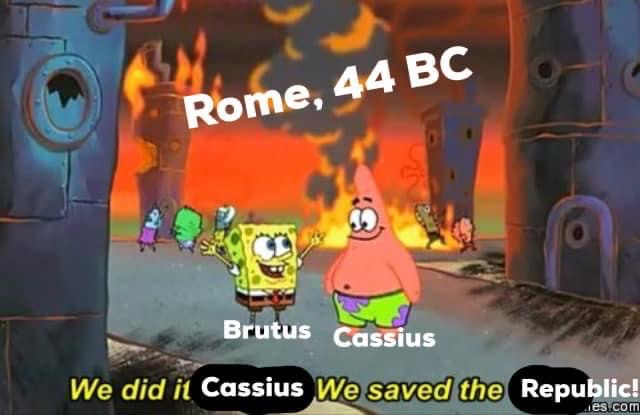Zoot: Hey man, I can’t figure out what side we’re on. Are we with the pirates or the frog captain?
Floyd Pepper: Oh, hey, man. Just play the gig. Never get involved in politics…
— Muppet Treasure Island

Well, folks, it’s the Ides of March, so I bet you all came here for some dank Ides memes and a lot talk about Caesar’s death. But I like to occasionally surprise you and throw Julius a bone, so because you can go just about anywhere for that sort of thing today, I’m instead going to talk about one of my (and many classical scholar’s) favorite Caesar anecdotes: the time Julius was kidnapped by pirates.
My readers have heard allusions to this episode at least three times in my books, but I’ve never laid it out in full, and as my fictional Caesar will tell you, it is a rather good story worth the telling.

So, we join Julius on Pharmacusa, a Greek islet off the Turkish coast (modern day Farmakonisi), where he is being held for ransom by Cilician pirates in 75 BC. He’s twenty-five years old and was originally traveling to Rhodes to study under the famous rhetorician Apollonius Molon, one of Cicero’s old teachers. But, you might be asking, what is an ambitious, politically-minded young man doing hitting the books nine hundred miles away from Rome? To explain that, we’re going to leave Julius in his imprisonment (don’t worry about him, he can handle himself), and backtrack twenty-odd years and talk about the Social War.

You might recall from my post about the First Triumvirate, we talked about the senatorial factions of the optimates and the populares. These factions arose out the Social War, a civil war amongst Romans over the issue of who should be permitted Roman citizenship. As we said, the optimates were the more conservative group, looking to restrict privileges to a select aristocracy whenever possible, and the populares (at least in theory) were more interested in expanding rights to more Romans and to Rome’s newly-acquired territories.

Part of the reason these tensions came to a head in the 90s BC was Rome’s military expansion into the older Hellenistic kingdoms, and greater involvement in the affairs of the wider Mediterranean (as in their annexation of Cyprus and their arbitration of the royal succession in several lands, including Egypt). Ergo, the idea of who was a “Roman” was starting to change, and Latin Italians of the established senatorial class were becoming afraid of hordes of foreigners and upstart plebeian families clamoring for rights in the new confederation they all found themselves in. The lead populares were likely just as noble as many of their optimate opponents, but usually from further outside the older power structure and increasing the power base of the burgeoning empire would give them a chance to rise in an otherwise very restrictive system.

As the conflict escalated, the populares were lead by Julius’ uncle, Gaius Marius. This is why throughout his political career Julius would identify with that faction; remember this is a world where loyalty to Rome is only superseded by loyalty to one’s gens and larger kin network. Marius was married to one of Julius’ paternal aunts, so gens Julii would follow his political fortunes. The optimates, in turn, were lead by Lucius Cornelius Sulla, a former protégé of Marius’.

Sulla has been a little buried in the contemporary consciousness, but that is in part because his life and career are a presentiment of Caesar’s and he has been eclipsed by the brilliance of Julius’ star. But many of the accomplishments we think of as Caesarian were achieved first by Sulla. He was an inspired general who was instrumental in Marius’ defeat of the great Numidian king, Jugurtha, as well as the victor of the Germanic Cimbrian War, and the conqueror of Mithridates VI Eupator (Mithridates the Great), the last of the great independent Pontic kings.

In fact, the last two of those he would achieve during the domestic turmoil of the Social War. Much of the war would be conducted by Sulla marching off with army to deal with external threats and the populares trying to make it so he couldn’t come back. In response, Sulla will be become the first Roman general to break that venerable tradition and march home at the head of his legions and enter Rome to crush Marius and his populare forces. This is one of the many ways Julius could justify crossing the literal Rubicon a generation later — Sulla had already crossed the figurative Rubicon years earlier. Sulla also revives the ancient office of Dictator, unused in Rome since the Carthaginian wars, and installs himself over the Senate. He engages in a vicious proscription that will purge the populare ranks and sow the seeds of animosity that will eventually lead to the Civil Wars. Sulla emerges from the Social War victorious, but in a last irony, his breaking with the oldest Roman traditions would speed the end of optimate rule as surely as a Marian victory would have. Because his actions will arguably create Julius Caesar.

Julius is too young to have actively fought in the Social War, but his own world changes considerably during that period. In 85 BC, when he is sixteen, his father dies, which remember, in the Roman world leaves him as the Julii paterfamilias. With his Uncle Marius’ support, he also marries populare ally Lucius Cornelius Cinna’s daughter, Cornelia. This moves him firmly into the populare camp, and will be absolutely devastating for his prospects when Sulla defeats the populares in 82 BC. His father-in-law is murdered by his own mutinous troops and Marius’ body is exhumed and thrown into the Tiber by the victorious optimates. Julius’ only older male supports are dead and his political enemy has just declared himself Dictator For Life. Sulla strips him of his inheritance, Cornelia’s dowry, and a priesthood he’d been elected to. What’s a clever boy to do but go into hiding?

Now, I know what you’re all thinking (besides grumbling that I promised you all a pirate story) — it sure seems like Sulla is in an optimate Baby Hitler scenario. If he was already executing so many of his populare opponents, why didn’t he kill Julius? The problem with all of Rome’s civil wars is that the sides are never as clear as they appear at first blush, and Julius’ mother is an Aurelii, a prominent optimate family. With their invention, and that of the Vestal Virgins, Sulla is (very reluctantly) convinced to spare Julius’ life. He tries to force his young rebel to at least divorce Cornelia, but Julius won’t hear of it and finds himself a military commission outside of Italy in order to fly under Sulla’s radar, in case the dictator changes his mind. Sulla, for his part, is deeply uneasy nonetheless, remarking that he “saw many a Marius in Caesar.”

Despite entrenching himself as a lifetime dictator, circumstances intervene and Sulla resigns from the dictatorship and public life in 79 BC, dying the next year. Although Suetonius will claim that Julius will later mock Sulla’s decision to relinquish the dictatorship as being stupidly shortsighted (frankly, sounds about right, and possibly accurate…), in the moment, Julius will make sure Sulla is good and dead before he shows his face again in Rome. He still doesn’t have his inheritance, so he takes a house in Ovid and Propertius’ favorite low-class haunt, the Subura district, and turns to legal advocacy to make ends meet. He quickly makes a name for himself as an exceptional orator known for his relentless prosecutions of corrupt former proconsuls, earning even fastidious Cicero’s praise. But Julius doesn’t believe in doing anything by halves, so he decides on that pilgrimage to Rhodes to sharpen his skills. Which brings us back to Pharmacusa.

The Mediterranean pirates of the last century BC were like their Caribbean descendants in that they were on the hunt for shipboard loot, but they also conducted a roaring trade in hostage ransom payments much on par with Islamic-Crusader politics. I’m sure they took anything not nailed down on Julius’ ship, but he was worth much more to them alive than he was at the bottom of the Aegean. And I’m also sure Julius wasted no time informing the pirates just whom they’d managed to capture. So, most of his traveling companions were turned loose to raise said ransom, and Julius was put under house arrest on Pharmacusa to await their return. Granted, when he told the pirates that they were imbeciles for demanding only twenty gold talents and insisted that they change the ransom to fifty, they should have gotten an inkling of just the sort of person they were dealing with.

A dead hostage pays no coin, so it was in the pirates’ best interest to take care of their valuable prisoner until they got their money. As a result, for thirty-eight days, Julius pretty much did as he pleased at Pirate Club Med, and generally ran roughshod over his captors as the mood struck him. He exercised with the pirates to stay in shape, wrote poetry, and worked on his oratory. The latter two he mercilessly subjected his jailers to, and insulted them when he thought they weren’t showing the proper appreciation for his talents. It reached a point where he would demand that they be quiet when they were being too loud, and they would actually comply.

Now you’re definitely wondering why the hell the pirates put up with this, and the answer seems to be that Julius amused them. Some of that is undoubtedly his legendary charm, but one must also remember this is 75 BC. The pirates hadn’t kidnapped the Hammer of the Gauls— they had kidnapped a smart-alecky twenty-five-year-old with a big mouth and a bigger sense of his own importance. So, they humored him for a month and pretended to be frightened when he would pause mid-slam poetry session to remind them that once his ransom was paid, he’d come back with an army and crucify the lot of them. I’m sure they were still laughing at him behind his back when his messengers returned with those fifty talents and they stood on the shore waving him onto his ship. It’s possible they were still chuckling amongst themselves when Julius showed up a couple of month later with a Roman fleet and routed their whole operation.

Having learned too late their former hostage was, as he would be to his dying breath, a man of his word, the pirates were rounded up and Julius dumped them on the doorstep of Marcus Junctus, the proconsul of Asia that year. Junctus is delighted and wants to sell them as slaves, but Julius won’t hear of it. Because that’s not what he told the pirates he would do to them when he came back. Realizing he’ll just have to do everything himself, he takes back the pirates and summarily crucifies every last one of them. Which is as brutal an execution as many of you were taught in Sunday School; the difference between the deaths of Jesus and these buccaneers is that despite his rather cruel resolve, Julius chooses to cut the throats of the pirates before they’re strung up, so they don’t actually suffer more than they have to. Because, you know, they all had shared some good times together.

This might be the first documented instance of the clementia Caesaris, the famous mercy Julius routinely showed his enemies. It may seem like small comfort to these (still very dead) pirates, but it must be viewed in the context of the times. In the often rigidly classist ancient world, the righteousness of one’s actions were governed by your social position and that of your adversaries. A Roman aristocrat like Julius must behave a certain way when dealing with a defeated Jugurtha of Numidia or Mithridates of Pontus, but he had precious few obligations to low-class enemies like pirates; this is demonstrated by the fact that it wasn’t as if Proconsul Junctus tried to stop him from executing his captives. It seems insane to our modern morals, but by ancient standards, Julius treated the pirates with unusual respect, while maintaining his own dignitas by avenging his captivity. This a distinctly populare approach, and it was potentially revolutionary in a way that so many of Julius’ actions would be in the eyes of his optimate critics. This small and sometimes humorous escapade of Caesar’s youth would actually have profound ramifications for his future, one that would put him on the path where his Sullian appetites and his Marian worldview would make him the pincushion of former friends and enemies alike.

Leave a comment